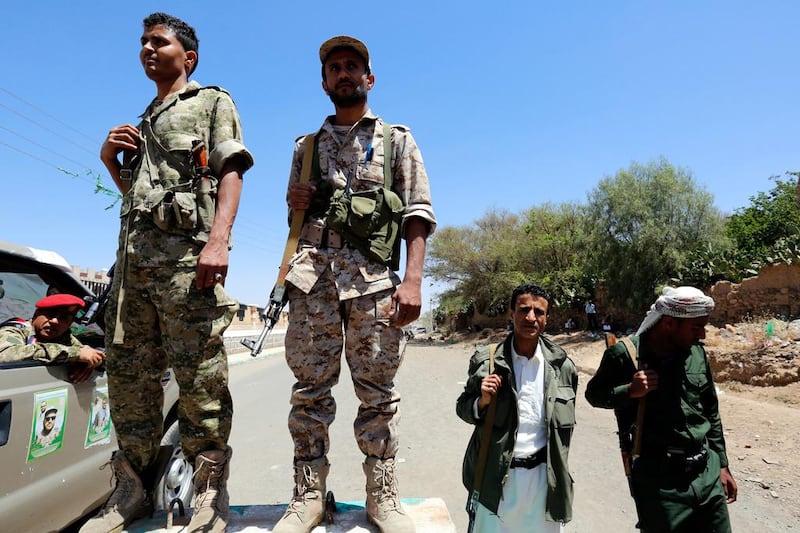The prospect of increased Iranian support for the Houthis has gained media traction in recent weeks following the publication of two investigative reports by Reuters and Conflict Armament Research. The central argument outlined in the Reuters report is that Iran has begun ramping up its support to the Houthis “through training, arms and financial support” in a bid to “pre-empt a tougher policy towards Iran signalled by US president Donald Trump”.
According to Iranian Technology Transfers to Yemen, CAR’s March 2017 report, pro-Houthi forces are deploying the recently unveiled Qasef-1 drone in kamikaze-style attacks against Saudi-led coalition air defence systems in Yemen. The Houthi-led ministry of defence asserted that the Qasef-1 – along with three other surveillance drones on display at an exhibition in Sanaa – was manufactured in Yemen. The Yemeni government, however, believes Iran has provided these offensive drone capabilities.
Iran is widely believed to be providing support to the Houthis, including arms shipments and military advice or training, but the recent reports suggested Iran may be considering or providing greater support.
The anonymous sourcing in the Reuters report makes it difficult to discern rhetoric from intent to act. For example, the anonymous Iranian officials Reuters quoted may merely want to confront bombastic Trump administration rhetoric with their own. Or, Iran may – in direct response to the United States’s aggressive posturing – actually augment its military support to the Houthis.
Regardless of the exact level of support, there is little doubt that the longer the war continues in its current form, the more entrenched the Houthi-Saleh and Houthi-Iran relationship will become. Iran probably sees involvement in Yemen as an efficient way to needle Saudi Arabia and the United States at the same time, and, given their current difficulties, the Houthis will take any international support they can get. This situation is not in the national security interest of certain Gulf countries.
Yet, critically for the coalition, the Houthi-Iran relationship remains an alliance of convenience, not necessity. The Houthis may still be willing to give up Iran as an ally – as well as their other ally of convenience, former president Ali Abdullah Saleh – in favour of a relationship with Saudi Arabia. To arrange this, the coalition – and Saudi Arabia in particular – could rely on a strategy they employed this time last year.
The Houthis previously signalled they were ready to exchange allies for political rights during unprecedented direct talks with Saudi Arabia in March 2016. After agreeing to a border ceasefire during these talks – a major breakthrough in the war – the Houthis immediately came out with statements explicitly condemning Iran. These statements, along with the Houthi decision to engage in talks without Saleh, were widely read by Yemen experts as a Houthi willingness to give up their relationships with Iran and Mr Saleh under the right circumstances.
Over the following few months, as talks with the Houthis shifted from the Saudis back to the Hadi government, the momentum was lost. President Abdurabu Mansour Hadi replaced vice president Khaled Bahah with Ali Mohsen, an enemy of the Houthis, just before peace talks in Kuwait. The Houthis probably perceived their goodwill gesture of condemning Iran as having been met with a gesture of ill-will by the Yemeni government. The delegations tried to overcome this slight and partially succeeded, but, ultimately, Mr Hadi and Houthi leader Abd Al Malik Al Houthi squashed the proposal. With the momentum broken, the border ceasefire negotiated between Saudi Arabia and the Houthis also broke down.
Although the success of the March 2016 talks was limited in duration, they hinted that the combination of direct Saudi-Houthi talks and political will could lead to a new kind of alliance arrangement in Yemen – specifically one that might strip Iran of its influence.
Such talks would not be easy: Saudi Arabia and its coalition partners would have to carefully manage their interests, especially as they diverge from the personal interests of Mr Hadi or Ali Mohsen, the vice president, and the Houthis would have to carefully manage Saleh and his loyalists. These could be difficult, or even insurmountable, obstacles.
Yet, in lieu of such diplomacy, we can expect ramped-up Iranian support in one form or another to the Houthis in concert with increased US support to the coalition. The additional Iranian support could help solidify the Houthi-Iran relationship beyond one of convenience. If that happens, the opportunity to diplomatically “turn” the Houthis – and prevent a long-standing Iranian presence in Yemen – may dissipate if it has not already.
Anthony Biswell is a senior analyst at The Delma Institute, and a contributor to the West Asia and North Africa Quarterly. Elana DeLozier is the founder and president of The Sage Institute for Foreign Affairs





